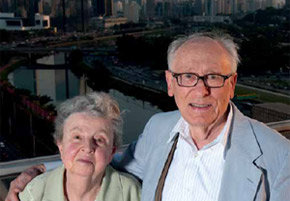Pilot project attracts scientists from abroad to form research groups in São Paulo
A FAPESP initiative aims to establish collaborative projects between institutions in São Paulo and high-level researchers like Ruth and Victor Nussenzweig from New York University, who will coordinate a project at Unifesp.
Pilot project attracts scientists from abroad to form research groups in São Paulo
A FAPESP initiative aims to establish collaborative projects between institutions in São Paulo and high-level researchers like Ruth and Victor Nussenzweig from New York University, who will coordinate a project at Unifesp.

A FAPESP initiative aims to establish collaborative projects between institutions in São Paulo and high-level researchers like Ruth and Victor Nussenzweig from New York University, who will coordinate a project at Unifesp
By Fabrício Marques
Pesquisa FAPESP – Two Thematic Projects have been approved within the São Paulo Excellence Chairs (SPEC) program—a FAPESP pilot project that aims to establish collaborative projects between institutions in the state of São Paulo and high-level researchers abroad.
One of the projects is expected to bring Victor and Ruth Nussenzweig to Brazil. Both 84 years old, the Brazilian couple has lived in the United States since the 1960s. They have become leading international figures in the search for malaria treatments and vaccines.
Andréa Dessen de Souza e Silva, a Brazilian scientist who moved to France, also had a project selected for the program and will lead a group of researchers at the National Biosciences Laboratory (LNBio) in Campinas. Since 2000, Dessen has lead a group researching bacterial pathogenesis at the Institute for Structural Biology in Grenoble, France.
The SPEC program aims to bring to Brazil renowned scientists who want to coordinate thematic projects in their fields at universities and laboratories in São Paulo State.
The researchers will maintain their relationships with their home institutions but will be required to spend 12 weeks out of the year in Brazil over the project’s minimum 5-year period. Their job will be to coordinate a group of postdoctoral, doctoral and even undergraduate students receiving FAPESP funds.
“We hope that bringing high-level researchers here will form the nuclei of research groups in areas where we seek excellence and will allow these groups to move forward more quickly,” said Hernan Chaimovich, special advisor to the FAPESP Scientific Board of Directors.
According to him, the initiative is part of FAPESP’s strategy of incentivizing scientific research in São Paulo to become more international. “FAPESP’s mission is to improve the quality of science, technology and innovation in São Paulo State, and that’s why we look across borders. We hope that the groups formed by initiatives like SPEC are able to obtain funding through international support agencies,” he affirms.
The program is open to institutions and researchers with top-notch curriculum vitae interested in establishing partnerships.
Studies conducted by the Nussenzweigs in the United States led to vaccine prototypes tested in the 1980s that managed to guarantee immunity, albeit only for very short periods.
The Nussenzweigs have both been working at New York University since 1960, studying the malaria parasite. The couple is currently working on two fronts: the search for a vaccine against malaria caused by Plasmodium vivax and techniques to knock out the proteins essential to the parasite’s development.
New inhibitors
The Thematic Project to be coordinated by the Nussenzweigs at Universidade Federal de São Paulo (Unifesp) aims to characterize enzymes essential to the development of plasmodium parasites and to find new inhibitors with potential for development into drugs against malaria.
“I will bring in a Chinese researcher who has been working with me in New York for four years. We will also recruit other PhDs and postdocs,” said Victor.
They will work at Unifesp with researchers they selected from doctoral and postdoctoral programs at New York University, including professors Maurício Martins Rodrigues, Sérgio Shenkman and Nobuko Yoshida. The Terms of Award for the project should be signed in coming weeks.
Last July, Andréa Dessen was selected as the second researcher for the pilot program. Ms. Dessen received a degree from the Universidade do Estado do Rio de Janeiro (UERJ) in Chemical Engineering in 1987 and moved to the United States 25 years ago.
Before settling in France, she finished her doctorate at New York University and conducted her postdoctoral studies first at the Albert Einstein College of Medicine and later at Harvard University. She specialized in the study of protein structures using biochemistry and crystallography.
“I have always studied the structure of proteins related to medicine. I have worked with HIV and inflammation,” she said. Her current focus is bacterial virulence, and she studies the three-dimensional structures of the proteins that form the cell walls of bacteria.
The objective is to understand the structures involved in the synthesis and repair of bacterial cell walls and to try to block infectious processes. “One target is the structures that allow for resistance to antibiotics,” she affirms. This is the focus of the work she will develop in Campinas.
Ms. Dessen has wanted to return to Brazil for some time. “However, I have a job in Grenoble and two small children, and I wouldn’t like to return permanently. The format of the SPEC program was perfect,” she said. Dessen gave a lecture at LNBio last year, and began conversations with laboratory director Kleber Franchini about collaboration with the institution. In addition to David Neves, a Brazilian research assistant who did his postdoctoral work with Dessen in France, the research team will also include two doctoral fellows and one postdoctoral fellow.
“I have a person who I trust coordinating the group in Campinas,” said Dessen. According to her, the arrangement will allow for a robust exchange between Campinas and Grenoble, including travel for researchers from both institutions. Two other projects are being evaluated by FAPESP for the SPEC program: one on climate change and the other on materials science.
“Proposals may be made in any area of knowledge, as long as they involve high-level researchers,” said Chaimovich.








